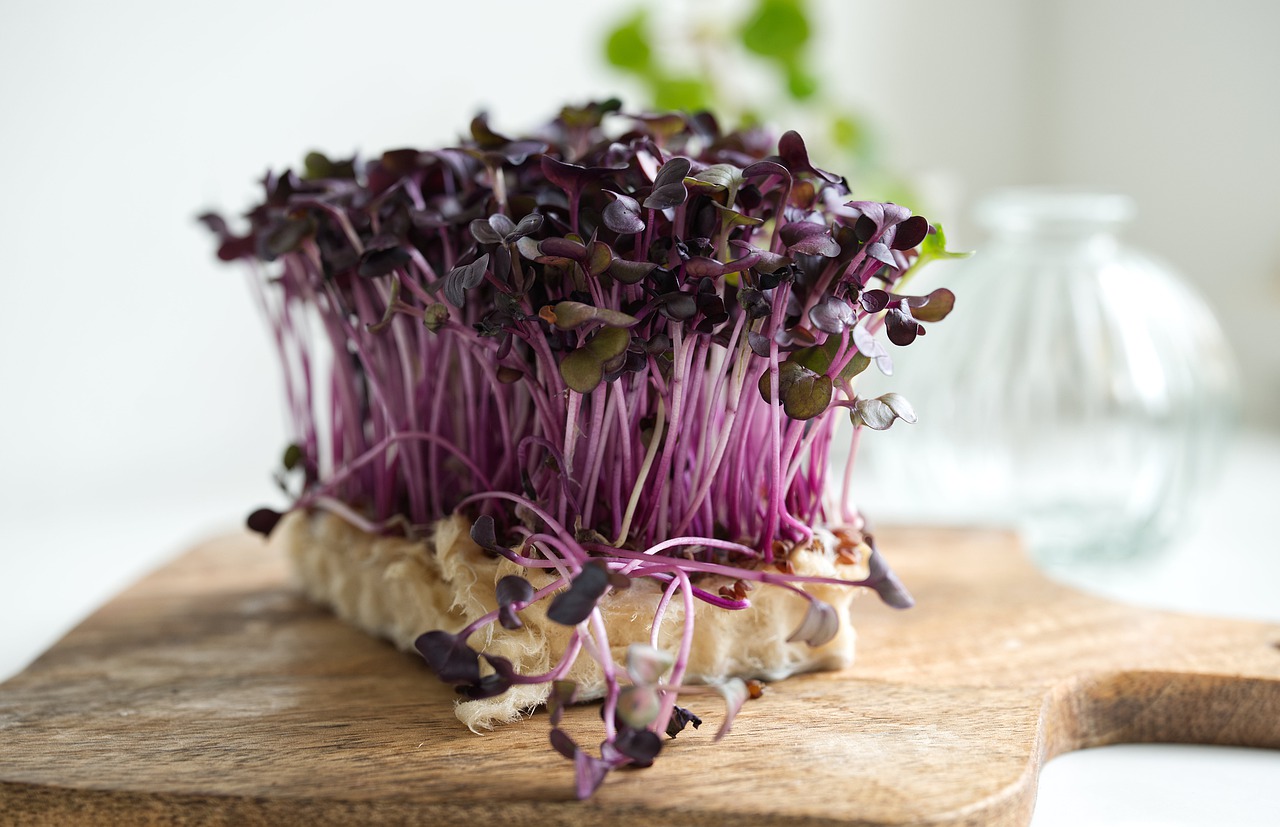These spicy little numbers belong in your daily diet, let me tell you why. Not only do radish microgreens add a spicy, crunchy texture to almost any meal, they are also packed full of nutrients.
Although microgreens are the young seedlings of their mature plants, don’t let their micro size fool you, these bad boys pack a serious macro nutritional punch.
Microgreens have been found to be 4 to 40X more concentrated with nutrients than their mature counterparts.
WHOA!
What? Don’t believe me?
Check out this comparative nutrition chart below and tell me that radish microgreens aren’t amazingly healthy.
Radish Microgreens VS Mature Radish Bulb Nutrition Chart
Based on a 100g serving:
| Nutrient | Radish Microgreens | Mature Radish Bulbs |
| Vitamin A | 8% | 0% |
| Vitamin B Complex | 6-24% | 4% |
| Vitamin C | 48% | 29% |
| Vitamin E | 25% | 0% |
| Manganese | 13% | 4% |
| Magnesium | 11% | 3% |
| Phosphorus | 11% | 2% |
| Calcium | 5% | 3% |
| Iron | 5% | 2% |
| Zinc | 4% | 2% |
| Copper | 6% | 3% |
| Potassium | 2% | 8% |
| Selenium | 1% | 1% |
| Calories | 24 | 24 |
Sources:https://nutritiondata.self.com/facts/vegetables-and-vegetable-products/2772/2 and https://homemicrogreens.com/radish-microgreen-nutrition/
What Are The Benefits Of Radish Microgreens?
An easier question to answer might be ‘What AREN’T the benefits of radish micros?’
But seriously, you can see how nutritionally dense radish shoots are.
What does that mean for you?
Well, they are the highest in Vitamins A, B Complex, C, and E, so let’s start there.
Vitamin A
Vitamin A is a fat-soluble vitamin that is naturally present in many foods.
It is important for normal vision, the immune system, and reproduction.
Vitamin A also helps the heart, lungs, kidneys, and other organs work properly.
Effects of Vitamin A on Health
Cancer: People who eat a lot of foods containing beta-carotene might have a lower risk of certain kinds of cancer, such as lung or prostate cancer.
Age-Related Macular Degeneration: Age-related macular degeneration (AMD), or the loss of central vision as people age, is one of the most common causes of vision loss in older people.
Among people with AMD who are at high risk of developing advanced AMD, a supplement containing antioxidants, zinc, and copper with or without beta-carotene has shown promise for slowing down the rate of vision loss.
Vitamin B Complex
Vitamin B complex is composed of eight B vitamins:
- B-1 (thiamine)
- B-2 (riboflavin)
- B-3 (niacin)
- B-5 (pantothenic acid)
- B-6 (pyridoxine)
- B-7 (biotin)
- B-9 (folic acid)
- B-12 (cobalamin)
Each of these essential vitamins contributes to your overall bodily function.
B vitamins play a vital role in maintaining good health and well-being. As the building blocks of a healthy body, B vitamins have a direct impact on your energy levels, brain function, and cell metabolism.
Effects of Vitamin B Complex on Health
Vitamin B complex helps prevent infections and helps support or promote:
- cell health
- growth of red blood cells
- energy levels
- good eyesight
- healthy brain function
- good digestion
- healthy appetite
- proper nerve function
- hormones and cholesterol production
- cardiovascular health
- muscle tone
Vitamin C
Vitamin C, also known as ascorbic acid, is a water-soluble nutrient found in some foods.
In the body, it acts as an antioxidant, helping to protect cells from the damage caused by free radicals. Free radicals are compounds formed when our bodies convert the food we eat into energy.
People are also exposed to free radicals in the environment from cigarette smoke, air pollution, and ultraviolet light from the sun.
The body also needs vitamin C to make collagen, a protein required to help wounds heal.
In addition, vitamin C improves the absorption of iron from plant-based foods and helps the immune system work properly to protect the body from disease.
Effects of Vitamin C on Health
Cancer prevention and treatment: People with high intakes of vitamin C from fruits and vegetables might have a lower risk of getting many types of cancer, such as lung, breast, and colon cancer.
Cardiovascular disease: People who eat lots of fruits and vegetables seem to have a lower risk of cardiovascular disease.
Vitamin E
Vitamin E is a fat-soluble nutrient found in many foods. In the body, it acts as an antioxidant, helping to protect cells from the damage caused by free radicals, functioning similarly to vitamin C.
The body also needs vitamin E to boost its immune system so that it can fight off invading bacteria and viruses.
It helps to widen blood vessels and keep blood from clotting within them. In addition, cells use vitamin E to interact with each other and to carry out many important functions.
Effects of Vitamin E on Health
There is no conclusive research indicating that vitamin E alone is responsible for any improvements in health, but that does not mean that it should not still be a part of a balanced, healthy diet.

Health Benefits Of Radish Microgreens
To sum up, here are the many health benefits radish microgreens provide:
- can potentially lower the risk of some cancers
- potentially lowers the rate of age-related macular degeneration
- aids in optimal organ function
- aids in maintaining overall good health
- helps protect cells from damage from the environment
- assists in keeping the immune system working properly
- could lower the risk of cardiovascular disease
What Do They Taste Like?
You can now see just how healthy radish micros are, now what about the taste?
It’s all fine and good for a food to be nutritious, but if it tastes bad, then who is going to eat it?
Luckily, radish micros are a tasty little treat.
They will add a spicy zing to your meal, that’s for sure.
You might think they would taste like the greens attached to the mature bulb, but in fact, they taste more like the bulb itself.
These little beauties will seriously enhance your meal, guaranteed!
How To Eat Radish Microgreens
I am a purist at heart and don’t like to cook any type of microgreen since they are so delicate.
I just love to eat them raw and top them on my sandwich, salad, wrap, burger, basically anything I’m eating.
And I am not shy with the number of micros I put on my food, we’re talking by the handful here, at least a cup per meal.
They are not very high in calories, so just go for it!
If the spicy radish flavour is too much, simply mix it with some pea shoots, that’s what I usually do and you get the best of both worlds. A spicy bite mixed with some fresh crunch. MMMM…good!
Want some inspiration? Just keep reading…
Radish Microgreens Recipes
I am not a chef, but I do know how to surf the web! So here are a few recipes I found with a simple google search that may help inspire you for your next microgreen meal.
- Roasted Halibut with Microgreen Cashew Puree
- Avocado Toast
- Homegrown Microgreens Salad
- Microgreens Omelet
Summary
Radish microgreens are rad, man!
So why not give them a try?
They will add a spicy kick to your meal as well as provide you with tons of health benefits, with minimal calories at that!
If you give them a try or already enjoy them, let us know in the comments below.
Stay Local,
Kathy & Jon
Your Friendly Neighbourhood Growers
Resources
https://ods.od.nih.gov/factsheets/VitaminA-Consumer/
https://www.healthline.com/health/food-nutrition/vitamin-b-complex#benefits


0 Comments